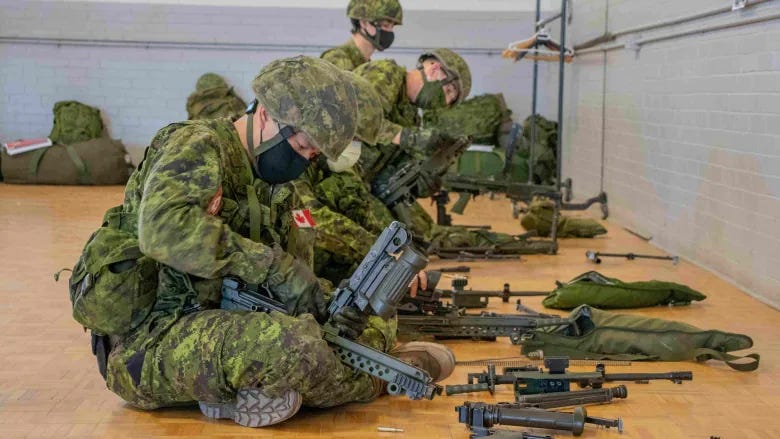Why are white supremacists so attracted to the military?
The Canadian military is investigating less than half of complaints about hateful conduct within its ranks, while suggesting they're just a series of isolated incidents
Since Gen. Wayne Eyre ordered a crackdown on far-right extremists in the military in September 2020, Canadian Forces have received 143 complaints of hateful conduct and racist attitudes in its ranks.
But only 70 of these complaints have resulted in a formal investigation, the CBC reports. And of these, just 20 soldiers have been fired.
"Overall number of incidents appear relatively low, though the true scope of the problem will not be understood for some time," officers admitted in a Feb. 26, 2021 briefing the CBC obtained. "Incidents appear to be primarily occurring among newer and junior members."
This latter point — that incidents of far-right extremism are occurring mostly among younger recruits — ought to give one pause.
It suggests this will be a growing issue in the coming years, a concern former vice-chief of the defence staff Guy Thibault expressed to the CBC.
Eyre’s directive resulted from a series of high-profile cases of far-right extremism in the military, including the case of Patrik Mathews, who was sentenced to nine years in prison last week for his involvement with the neo-Nazi militia The Base.
In the case of Erik Myggland, who was fired from the military for his involvement with the III%ers and Soldiers of Odin, senior military officials acknowledged that both those groups “are known to actively recruit CAF members."
This is about more than a handful of bad actors
Elizabeth Simons, a deputy director of the Canadian Anti-Hate Network, which tracks far-right extremism, tells The Orchard that the relatively low number of complaints being formally investigated is troubling and might suggest the Canadian Forces are in denial about the extent of the problem.
“It's the wrong approach to say it's a small number of far-right extremists in the ranks,” she says. “Even one is too many, and their approach needs to reflect that.”
The focus on explicit associations with hate groups, rather than loose collectives and networks is an outdated approach that allows some of those with far-right sympathies to fall through the cracks, says Simons.
Simons adds that military culture is inherently conducive towards hyper-nationalist perspectives, such as securing one’s country against a foreign threat and “defending western societal values.”
Far-right extremists who infiltrate the military can then proceed to use their training and skills for the far-right cause, which is precisely what Mathews did.
This is by no means unique to Canada — Australia, the U.S., the U.K. and Germany also have well-documented issues with racism in their forces.
“Virtually every country with a military will have extremists in their ranks,” Simons says.
Edited by Scott Schmidt
In other news …
Feds clawing back benefits for low-income seniors who accepted COVID payments
About 90,000 low-income seniors who accepted the Canada Emergency Response Benefit to make up for lost income during the pandemic are receiving a cut to their monthly Guaranteed Income Supplement (GIS).
Via the CBC: A single senior earning less than $19,248 qualifies for GIS. The cutoff for couples can be as high as $46,128, depending on their pension situation. In 2021, the maximum monthly payment under the program is $948.82.
"I am in a perpetual struggle," says Janet McLeod, 79, who works part-time while collecting GIS. "So to be cut back $300 a month is very difficult, paying rent and taking care of my other expenses, which are very modest."
While the government is clawing back funds for low-income seniors, the companies who used COVID relief funds to pay out shareholders seem to be doing just fine.
U.S. sanctions Israeli spyware firm at the centre of global hacking scandal
The U.S. Department of Commerce has added NSO Group, a firm whose Pegasus software was found to have hacked the phones of journalists, human rights activists, government officials and private citizens across the globe, to a list of foreign companies U.S. firms are prohibited from doing business with.
“NSO Group could not have operated without Israeli government knowledge and toleration, if not encouragement,” says David Kaye, a former United Nations special rapporteur for freedom of expression. “So part of this cannot be seen merely as the U.S. government making a statement about this particular company; it’s also a statement about the Israeli government, its export controls and engagement in transnational repression.”
But don’t get your hopes up — a State Department spokesperson clarified that the U.S. is not sanctioning the Israeli government.
Tigrayan and Oromo rebels are making their way towards Adis Ababa, Ethiopia’s capital, conquering towns on the way of the country’s major highway.
“We will bury this enemy with our blood and bones and make the glory of Ethiopia high again,” says Ethiopian Prime Minister Abiy Ahmed, who has ordered airstrikes on Tigray.
Meanwhile, a joint report from UN and Ethiopian human rights bodies, which Canada contributed $600,000 to, found severe human rights abuses committed on all sides of the conflict, including massacres, torture, executions and gang rapes of civilians.
According to UN human rights commissioner Michelle Bachelet, the bulk of abuses in the first eight months of civil war were committed by Ethiopian troops and their Eritrean allies, but in more recent months rebel forces have stepped up their brutality.
I’m taking a social media hiatus for November, so if you like this content, I’d urge you to share, subscribe and tell your friends:



